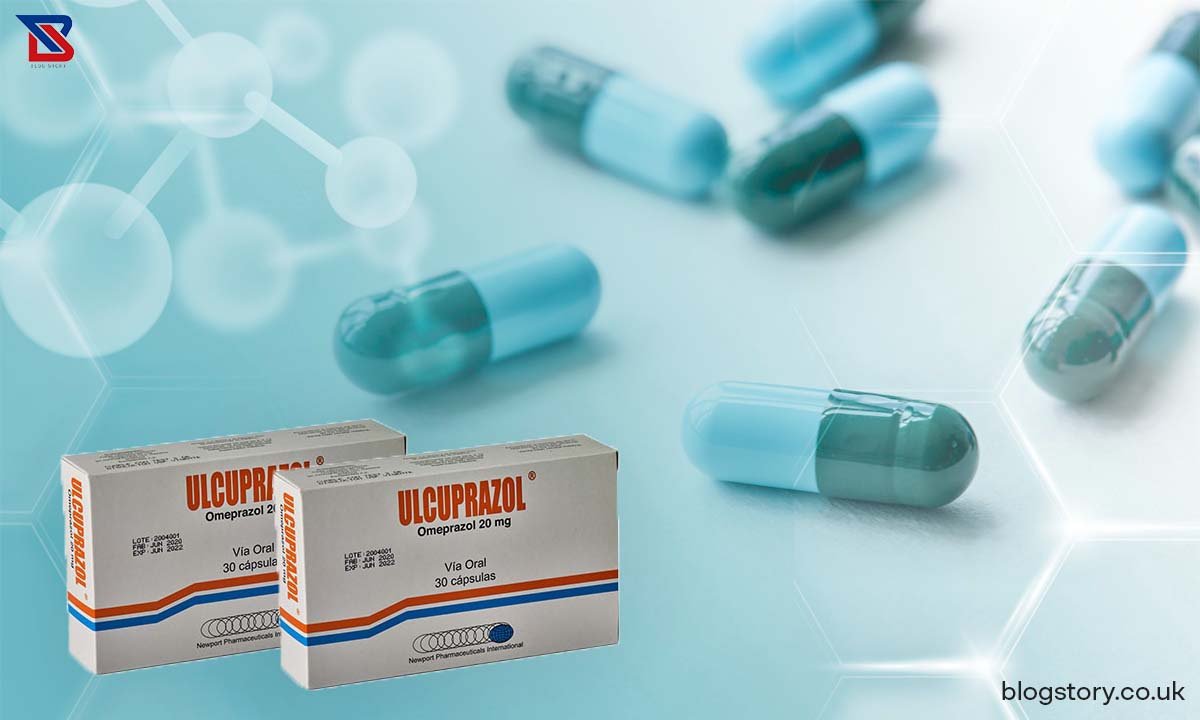
Ulcuprazol Unveiled: A Comprehensive Guide To Digestive Harmony
Welcome to the world of Ulcuprazol, your trusted companion in the realm of digestive well-being!
As we embark on this exploration, we’ll unravel the versatile applications and potential side effects of Ulcuprazol, providing you with valuable insights into its effectiveness and considerations.
Whether you’re seeking relief from heartburn, tackling gastrointestinal challenges, or exploring long-term maintenance, Ulcuprazol stands as a beacon of support.
Join us on this informative journey to better understand how Ulcuprazol can be a vital part of your digestive health toolkit.
Ulcuprazol: What’s That?
Meet Ulcuprazol – your stomach’s superhero!
This awesome medicine belongs to a group called Ulcuprazol pump inhibitors, and it’s here to save the day by turning down the stomach acid production dial.
Why, you ask?
Ulcuprazol is on a mission to tackle the troublesome symptoms of gastroesophageal reflux disease and other stomach acid-related issues.
Imagine it as a repair kit for your oesophagus, swiftly mending any damage caused by that sneaky stomach acid.
But wait, there’s more!
Ulcuprazol isn’t afraid to team up with antibiotics to take down gastric ulcers caused by the notorious helicobacter pylori (H. pylori) gang.
Just remember, Ulcuprazol isn’t the quick fix for heartburn.
It’s more like the trusty sidekick working behind the scenes to keep your stomach in tip-top shape!
So, whenever stomach woes strike, count on Ulcuprazol to be your stomach’s ultimate defender!
Description and Composition
Let’s dive into the fascinating world of Ulcuprazol – a cool compound that goes by the name of a substituted benzimidazole and is part of the Proton Pump Inhibitors squad.
Picture this: Ulcuprazol has a main character, and it’s none other than Omeprazole.
This active ingredient takes center stage, joined by some sidekicks known as inert ingredients or excipients.
Feel free to use the names Ulcuprazol and Omeprazole interchangeably throughout this adventure.
Now, what makes Ulcuprazol a star player in the health arena?
It’s all about inhibiting the final phase of gastric acid secretion.
Think of it as the superhero of stomach acid control!
Omeprazole, the lead in this story, comes in the form of a white to off-white crystalline powder.
This powder can handle some serious heat, melting at around 155 degrees Celsius.
Plus, it’s got some impressive social skills, freely mingling with ethanol and methanol, being a bit more reserved with acetone and isopropanol, and only dipping its toes into the water – it’s very slightly soluble.
But here’s where it gets exciting – Ulcuprazol comes in various shapes and sizes!
Capsules, injections, suspensions, and tablets are their go-to forms, each with its own dosage strength.
Whether it’s packets, suspension, tablets, or injections, Ulcuprazol has got it covered:
- Packets: 2.5 mg, 10 mg.
- Suspension: 2 mg/ml.
- Tablets: 20 mg.
- Capsules: 10 mg, 20 mg, and 40 mg.
- Injections: 40 mg.
So, there you have it – the epic tale of Ulcuprazol and its trusty sidekick Omeprazole, battling gastric acid and keeping things in check with style!
Ulcuprazol: The Dynamic Mechanism
Let’s unravel the mystery behind Ulcuprazol’s superhero moves in the world of gastric warfare!
Ulcuprazol Has a Secret Weapon: it throws a powerful punch by specifically putting the brakes on the H+/K+ATPase enzyme system at the secretory surface of the gastric parietal cell.
Imagine it as a mastermind shutting down the control center of gastric acid secretion.
Why is this enzyme so crucial?
Well, it’s like the conductor of the acid (proton) pump within the gastric mucosa.
That’s why Omeprazole, the star player in Ulcuprazol’s team, is hailed as a gastric acid pump inhibitor – it steps in to block the final step of acid production, keeping things under control.
And here’s the cool part: Ulcuprazol’s effect is like a dose-dependent superhero, swooping in to inhibit both basal and stimulated acid secretion, no matter what triggers the stomach’s acid-making machinery.
In the animal kingdom of studies, it’s been discovered that Omeprazole, after making a quick exit from the plasma scene, doesn’t just vanish.
Instead, it sets up camp within the gastric mucosa, holding its ground for a day or more.
Now that’s what I call a strategic retreat!
So, there you have it – Ulcuprazol, the mastermind behind the scenes, putting the brakes on the gastric acid symphony with its trusty sidekick, Omeprazole!
Ulcuprazol: Your Guide To Effective Heartburn Relief!
Welcome to the ultimate guide for achieving effective heartburn relief with Ulcuprazol!
In this section, we’ll uncover the secrets behind Ulcuprazol’s rapid and reliable action against heartburn discomfort.
Antisecretory Action: A Speedy Solution
- Take Ulcuprazol orally for a quick onset of antisecretory effects within just one hour!
- Experience maximum relief within two hours.
- Enjoy a lasting inhibitory effect up to 72 hours.
Prolonged Power: Behind the Scenes
- The secret to Ulcuprazol’s enduring effect lies in prolonged binding to the parietal H/KATPase enzyme.
- Even with a short half-life, the antisecretory effect continues for days after discontinuation.
- Witness a gradual return to normal secretory activity over 3 to 5 days.
Dose to Impress: Building Inhibition
- Repeated daily doses enhance Ulcuprazol’s inhibitory effect, reaching a plateau after four days.
- Single daily doses ranging from 10mg to 40mg can achieve 100% inhibition of 24-hour acidity in some patients.
More Than Meets the Stomach: Other Effects
- Ulcuprazol has no impact on thyroid function, carbohydrate metabolism, or hormone levels.
- No change in gastric emptying was observed after a single dose of 90mg.
- Note a temporary increase in intragastric bacteria concentration—resolved within three days post-treatment.
Journey Through The Body: Pharmacokinetics Unveiled
Embark on an intriguing adventure as Ulcuprazol’s enteric-coated capsules take you on a journey through the digestive landscape.
The magic begins with the specialized granule formulation, ensuring that the absorption of Omeprazole commences only after the granules bid farewell to the stomach.
Absorption: A Coated Adventure
- Ulcuprazol capsules boast an enteric-coated granule formulation for optimal absorption.
- Rapid absorption with peak plasma levels within 0.5 to 3.5 hours.
- Proportional peak concentrations up to 40mg, but nonlinear response beyond 40mg due to first-pass effect saturation.
Metabolism and Excretion: The Body’s Recycling Plant
- Extensive metabolism by the cytochrome P450 (CYP) enzyme system.
- Little unchanged drug excreted in urine; majority recoverable in feces.
- Identified plasma metabolites lack significant antisecretory activity.
Special Considerations: Geriatrics and Hepatic Health
As we navigate the realm of special considerations, let’s shed light on how Ulcuprazol caters specifically to the unique needs of the elderly.
Golden Years: Ulcuprazol in the Elderly
- Omeprazole elimination slightly decreased in the elderly, leading to increased bioavailability.
- Bioavailability comparison: 76% in elderly vs. 58% in young volunteers.
- Plasma clearance was reduced to 250mL/min in the elderly, half that of young subjects.
Liver Love: Navigating Hepatic Impairment
- Chronic hepatic disease increases bioavailability to approximately 100%, reflecting a decreased first-pass effect.
- Plasma half-life extended to nearly 3 hours.
- Plasma clearance drops to 70mL/min in patients with hepatic impairment.
Tailored Treatment: Dose Adjustments For Liver Health
Consider dose reduction, especially when maintaining the healing of erosive esophagitis in patients with hepatic impairment.
Unlocking The Powers of Ulcuprazol
Discover the versatile applications of Ulcuprazol, tailored to address a spectrum of digestive challenges.
Let’s navigate through its various uses with clarity and insight.
1. Tackling The Burn: Heartburns (Pyrosis)
Feel the relief as Ulcuprazol takes the spotlight in alleviating heartburns swiftly.
Whether it’s a fleeting discomfort or a persistent issue, Ulcuprazol is your trusted companion.
2. Battling the Backflow: Gastroesophageal Reflux Disease (GERD)
Dive into the targeted relief Ulcuprazol offers against the tumultuous waves of GERD.
From heartburn to erosive esophagitis, Ulcuprazol stands strong as your ally in this digestive struggle.
3. Stressing Less: Stress Ulceration
Ulcuprazol extends its support to combat stress ulceration, ensuring your digestive system stays resilient even in challenging times.
4. Ulcers, Be Gone! Treating Gastric and Duodenal Ulcers
Experience the healing touch of Ulcuprazol in addressing gastric and duodenal ulcers.
The journey to recovery is swift, with most patients finding relief within four weeks.
5. Zollinger-Ellison Syndrome: A Specialized Approach
Ulcuprazol steps in with a specialized approach for conditions like Zollinger-Ellison syndrome, multiple endocrine adenomas, and systemic mastocytosis.
It’s your long-term ally in managing pathologic hypersecretory conditions.
6. Acid Adventures: Prophylaxis and Long-Term NSAID Therapy
Ulcuprazol takes a proactive stance by offering prophylaxis in long-term NSAID therapy and acid aspiration scenarios.
It’s not just about relief; it’s about safeguarding your digestive well-being.
7. Maintaining Harmony: Erosive Esophagitis
Ulcuprazol isn’t just about healing; it’s about maintaining that hard-earned healing.
For erosive esophagitis, Ulcuprazol is your go-to for long-term maintenance, ensuring lasting relief.
Unveil the potential of Ulcuprazol, your comprehensive guide to digestive well-being, addressing a spectrum of conditions with precision and effectiveness.
Navigating Side Effects: What to Know About Ulcuprazol
Embarking on a journey with Ulcuprazol may bring about various side effects, each worth understanding for a comprehensive overview of your digestive well-being.
Let’s explore the potential effects in a shuffled order to provide you with a well-rounded understanding.
Potential Side Effects of Ulcuprazol:
- Nausea
- Gas (Flatulence)
- Abdominal Pain
- Dizziness
- Headache
- Vomiting
- Acid Reflux
- Diarrhea
- Rash
- Constipation
- Cough
- Upper Respiratory Infection
Less Common Side Effects:
- Chronic Inflammation of the Stomach
- Loss of Appetite
- Hair Loss
- Taste Changes
- Deficiency of Granulocytes in the Blood
- Gastric Polyps
- Bone Fracture (Osteoporosis Related)
- Destruction of Skeletal Muscle
- Abnormal Dreams
- Hip Fracture
Rare Side Effects:
- Liver Damage
- Inflammation within the Kidney
- Pancreatitis
- Dermatologic Disorder, Potentially Life-Threatening (Toxic Epidermal Necrolysis)
Important Note: This compilation does not encompass all potential side effects, and there may be additional effects not mentioned here.
Consult with your medical professional for a thorough understanding of the potential side effects associated with Ulcuprazol.
Your health is our priority!
May You Like Also: The Soymamicoco Journey: Savouring Wellness
To Conclude
In the grand tapestry of digestive care, Ulcuprazol emerges as a key player, offering a multifaceted approach to address various conditions.
From its rapid antisecretory action to comprehensive relief and potential side effects, this guide has navigated the intricacies of Ulcuprazol’s role in your well-being.
Remember, your health is a priority, and consulting with your medical professional ensures a tailored understanding of how Ulcuprazol can serve you best.
Here’s to empowered choices and a healthier, more harmonious digestive journey with Ulcuprazol!
You May Like Also:













Your point of view caught my eye and was very interesting. Thanks. I have a question for you.
canada pharmacy reviews
https://expresscanadapharm.com/# canadian mail order pharmacy
best online canadian pharmacy
They are always proactive about refills and reminders.
where can i get cipro online
Appreciate their commitment to maintaining global healthcare standards.
I’ve sourced rare medications thanks to their global network.
can you get cheap lisinopril without prescription
Their patient care is unparalleled.
A trusted partner for patients worldwide.
where to get cheap lisinopril price
Always greeted with warmth and professionalism.
Their private consultation rooms are a great addition.
get cytotec without dr prescription
Every pharmacist here is a true professional.
Can you be more specific about the content of your article? After reading it, I still have some doubts. Hope you can help me.